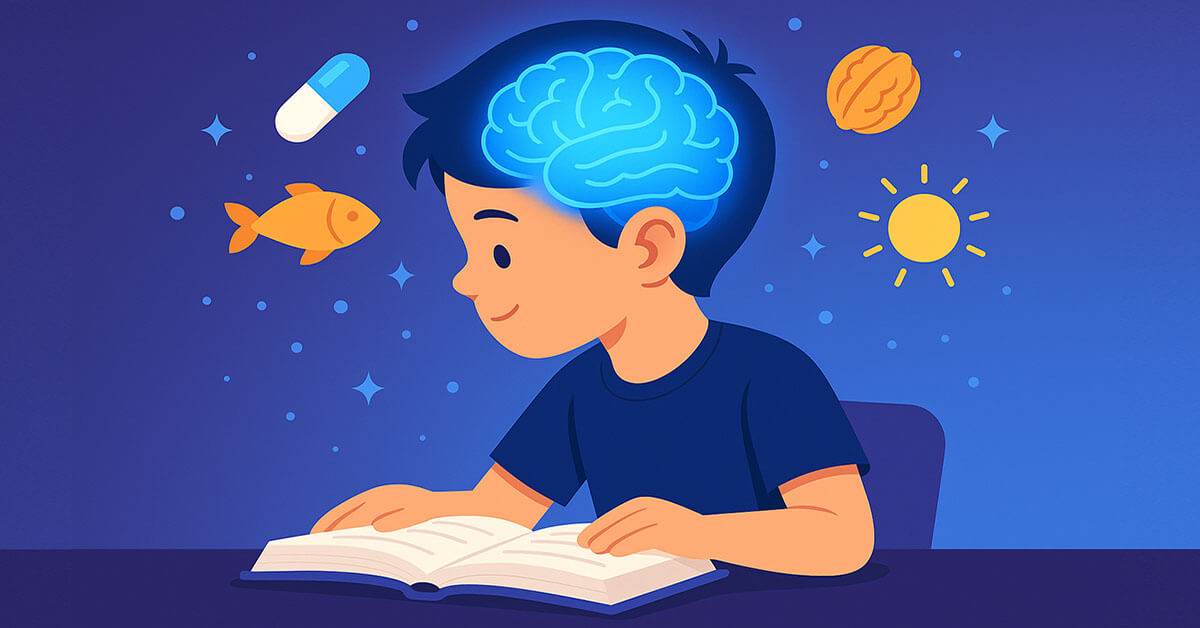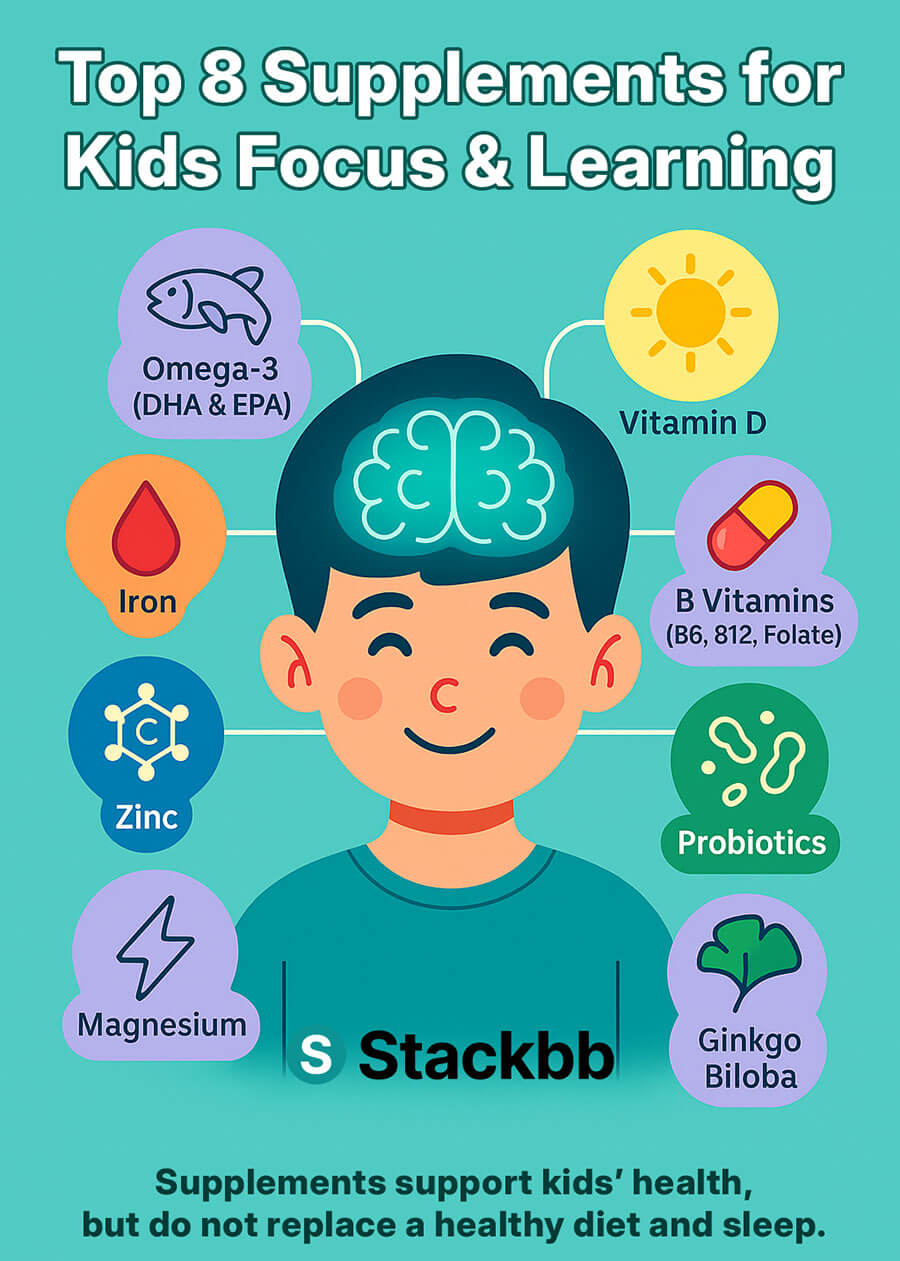
Top Supplements for Kids to Boost Focus, Memory, and Learning

Helping kids succeed in school goes beyond homework and study habits, nutrition plays a huge role in brain development, focus, and learning. While a balanced diet is the foundation, many children may still miss out on key nutrients that support attention and memory. In these cases, supplements can provide gentle, evidence-based support. Let’s look at the top supplements that may help boost focus, memory, and learning in children, and how to use them safely.
Why Supplements Can Help Kids Focus and Learn
Modern life is busy, and children’s diets are not always ideal. Picky eating, processed foods, and busy schedules can leave gaps in essential nutrients. When the brain doesn’t get what it needs, kids may struggle with concentration, energy, and even mood. Supplements are not a replacement for a healthy diet, but they can fill in the gaps and support a child’s growing brain. Certain nutrients have been studied for their impact on learning, memory, and attention, making them a valuable addition when needed.
Best Supplements for Focus, Memory, and Learning in Kids

1. Omega-3 Fatty Acids (DHA & EPA)
Omega-3s, especially DHA (docosahexaenoic acid), are vital for brain development. DHA makes up a large part of the brain’s structure and helps with communication between brain cells. Studies show that children who get enough omega-3s may have better attention, memory, and even behavior. While fatty fish like salmon and sardines are the best natural sources, many kids don’t eat enough of them. That’s where fish oil or algae-based omega-3 supplements can help.
✔️ Typical Dosage Range: 200–500 mg DHA daily, depending on age and product quality.
2. Iron
Iron is essential for carrying oxygen in the blood, and the brain relies on oxygen to function properly. Low iron levels are linked to fatigue, poor concentration, and even learning difficulties. Iron deficiency is common in children, especially picky eaters or kids on vegetarian diets. Supplementation can restore energy and focus, but it should be done carefully, since too much iron can be harmful.
✔️ Typical Dosage Range: Varies by age; consult pediatric guidance before supplementation.
3. Zinc
Zinc supports brain signaling and is involved in memory and attention. Research suggests that low zinc levels may be linked to attention difficulties in children. Because zinc also supports the immune system and growth, it’s an all-around important nutrient. Supplementing zinc may help kids who struggle with focus or who don’t get enough from food sources like meat, seeds, and beans.
✔️ Typical Dosage Range: 5–10 mg daily, adjusted to age and diet.
4. Magnesium
Known as the “calming mineral,” magnesium helps relax muscles and nerves. For kids, this can translate into better focus and fewer restlessness issues in the classroom. Modern diets, heavy in refined foods, are often low in magnesium. A supplement may help improve sleep quality, reduce hyperactivity, and promote steady concentration during the day.
✔️ Typical Dosage Range: 100–200 mg daily, based on age and needs.
5. Vitamin D
Vitamin D is best known for bone health, but it also plays a role in brain development and mood. Low vitamin D levels have been linked to difficulties with focus and memory. Since many children spend more time indoors and less time in sunlight, deficiencies are common. Supplementing vitamin D can support both physical and mental health.
✔️ Typical Dosage Range: 400–600 IU daily, per pediatric recommendations.
6. B Vitamins (B6, B12, Folate)
B vitamins are crucial for energy metabolism and the production of neurotransmitters. Without enough B vitamins, kids may feel tired, irritable, or have trouble concentrating. Folate (B9) is especially important for brain development, while B6 and B12 support nerve health and mental energy. Multivitamins for children often include these nutrients.
✔️ Typical Dosage Range: Often provided in children’s multivitamins; follow product guidelines.
7. Probiotics
The gut and brain are closely connected through the “gut-brain axis.” A healthy gut microbiome can support mood, behavior, and even focus. Emerging studies show that probiotics may help with attention and reduce anxiety in children. While more research is needed, probiotics are safe and may offer both digestive and cognitive benefits.
✔️ Typical Dosage Range: 1–5 billion CFU daily, depending on strain and formulation.
8. Ginkgo Biloba (for older children and teens)
Ginkgo biloba is a plant extract traditionally used to support memory and circulation. Some studies in adolescents suggest it may improve learning and focus. However, it’s generally not recommended for very young children. Teens may benefit under supervision, especially during exam periods, but long-term use is not advised.
✔️ Typical Dosage Range: 60–120 mg daily for teens, short-term use only.
Lifestyle Factors That Matter Too
While supplements can help, they’re only one piece of the puzzle. Kids need enough sleep, regular physical activity, balanced meals, and limited screen time. A supplement won’t make up for poor lifestyle habits, but when combined with healthy routines, it can provide a noticeable boost to focus and learning.
Safety and Precautions
Not all supplements are safe for all children. Doses should be adjusted to age and body size, and products should be chosen specifically for kids. Some nutrients, like iron, should only be used if a deficiency is confirmed. Parents should always check with a pediatrician before starting a new supplement, especially if the child is already taking medication.
Conclusion
Supplements can support children’s focus, memory, and learning by filling nutritional gaps and boosting brain health. Omega-3s, iron, zinc, magnesium, vitamin D, B vitamins, probiotics, and ginkgo biloba are among the most studied and effective. Combined with healthy lifestyle habits, these nutrients can make a real difference in your child’s academic performance and overall wellbeing. Always remember: supplements should complement, not replace, a balanced diet and good daily routines.
FAQ about Kids’ Supplements for Focus and Learning
Do kids really need supplements for focus?
Not always. A balanced diet often provides enough, but supplements can help in cases of deficiency, picky eating, or increased school-related stress.
Are these supplements safe for children?
Yes, when used in age-appropriate doses and chosen carefully. Always consult a pediatrician if you are unsure about starting a supplement.
How long before supplements improve focus?
It depends on the supplement. Omega-3s and probiotics may take weeks to show results, while correcting an iron deficiency can improve focus in days.
Can supplements replace good sleep and diet?
No. Supplements are meant to support kids’ health, not replace healthy food, good sleep, and daily routines. They work best as part of a holistic approach.
This article was originally published on Stackbb, your trusted source for science-based supplement guides.






